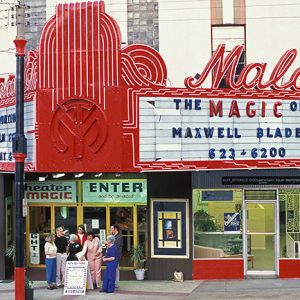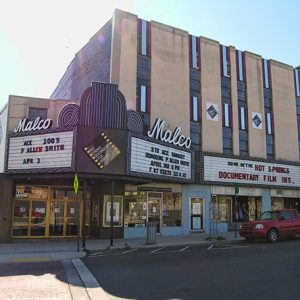calsfoundation@cals.org
Hot Springs Documentary Film Festival (HSDFF)
Billing itself as the longest-running documentary film festival in North America, the internationally recognized Hot Springs Documentary Film Festival (HSDFF) takes place each fall over about nine days in Hot Springs (Garland County). Since its inception in 1992, sponsored by the Hot Springs Documentary Film Institute, the HSDFF has become renowned as a prestigious venue for showing documentary films and attracting celebrities, filmmakers, industry figures, and audiences from across the nation and around the world. It bills itself as the oldest nonfiction film festival in North America.
The festival is a qualifying event for filmmakers competing for Academy Awards in Best Documentary Short Subject. The festival is one of about three dozen such qualifiers among thousands of film festivals. Celebrity guest Peter Coyote, a noted actor whose voice is instantly recognizable as the narrator of Ken Burns documentaries, said, “There is no better energizer for a documentary with Oscar ambitions than the Hot Springs Documentary Film Festival.”
The mission of the nonprofit 501(c)(3) organization is to champion nonfiction storytelling by providing a platform for storytellers to entertain, educate, and broaden perspectives. Along with film screenings, the festival includes panel discussions, question-and-answer sessions, tributes to notable industry people, and access to celebrity guests and visiting professionals. The HSDFF aims to create a supportive environment for filmmakers and audiences to celebrate their appreciation for documentary filmmaking, with the annual festival being augmented by year-round film-related programming.
Over the years, the festival has been awarded grant funding by organizations including the Academy of Motion Picture Arts and Sciences, the Corporation for Public Broadcasting, the National Endowment for the Arts, and the Winthrop Rockefeller Foundation, as well as sponsorships from local businesses including the Arlington Hotel and Oaklawn Racing Casino Resort. Party sponsors have included ESPN Films, MSNBC Universal, and NatGeo Documentary Films. The Wellness Series has been sponsored by AARP and St. Vincent Hot Springs.
The festival traces its history back to 1991 when Sy Gomberg, who was then head of the documentary branch of the Academy of Motion Picture Arts and Sciences, visited Hot Springs. He loved the city and encouraged the idea of a documentary film festival. In 1992, a small group of arts enthusiasts in the Hot Springs area initiated the first Hot Springs Documentary Film Festival. A special attraction that year was award-winning actor James Whitmore (Asphalt Jungle, Planet of the Apes, The Shawshank Redemption). Ten documentary films that had been nominated for Academy Awards were shown, with Whitmore commenting that Hot Springs “could be the documentary capital of the world.”
By 1993, the number of entries quadrupled, with forty-four documentary films being screened. Actor James Earl Jones was featured that year at a fundraising gala and stated, “I see the 1990s as holding the promise of an unparalleled era of popularity for nonfiction film and video, with the Hot Springs Documentary Film Festival as one of the genre’s most important venues.” In 1994, more than 5,000 people attended the festival. Several dozen films were screened, and fourteen documentary filmmakers were present. Establishing a tradition of filmmaker participation in the festival, they met with the audience, answered questions, and took part in discussions about their work.
In 1994, more than 5,000 people attended the festival. Several dozen films were screened, and fourteen documentary filmmakers were present. In 1996, the Malco Theatre was acquired in order to become the festival’s permanent home. The two-screen movie theater, located at 817 Central Avenue in downtown Hot Springs, was a catalyst in providing a year-round schedule of activities and an enhanced mission. After experiencing financial troubles, the HSDFF sold the Malco Theatre in 2013 in order to retire its debts. In subsequent years, the festival would be held at Hot Springs’ historic Arlington Hotel, the festival’s host sponsor.
In February 1997, the festival was selected as a stop on the Library of Congress Film Preservation Tour featuring films from the National Film Registry. The tour was created to bring noteworthy American movies to big screens across the country, to celebrate a century of American movie-making, and to promote awareness of the need for film preservation. The Hot Springs event was attended by then-president of the Academy of Motion Picture Arts and Sciences, director Arthur Hiller.
While the festival is truly international in nature, it also serves to spotlight its home state of Arkansas. Featured films have included a documentary about Arkansan Glen Campbell, a film by documentarian Pam Maus on women in politics noting Arkansas’s own Hattie Caraway, a feature about the Marshallese community in Arkansas, and the critically acclaimed Command and Control about the 1980 Titan II Missile Explosion near Damascus (Van Buren and Faulkner counties). A Japanese entry is traditionally sponsored each year by the Sister City Foundation due to the close relationship between Hot Springs and its sister city of Hanamaki, Japan.
Among its special events, the festival hosted Dee Wallace Stone, who played the mother in Steven Spielberg’s 1982 hit film, E.T. The November 2007 fundraising event included a screening of that movie. Other celebrity guests who have attended the festival and special events through the years include Ed Asner, Barry Bostwick, Beau Bridges, Geraldine Chaplin, Eleanor Coppola, Peter Coyote, Joycelyn Elders, Todd Fisher (son of Debbie Reynolds), poet Allen Ginsberg, Louis Gossett Jr., Tess Harper, Billy Hayes (focus of the movie Midnight Express), Tippi Hedren of Alfred Hitchcock’s The Birds, “Good Ol’ Freda” Kelly (longtime secretary to the Beatles), Diane Ladd, Susan McDougal, Tig Notaro, Austin Pendleton, Connie Stevens, Star Trek’s George Takei, Harry Thomason, Stephen Tobolowsky of Groundhog Day, Kathleen Turner, Brenda Vaccaro, and Robert Walden.
Other industry professionals who have attended the festival include Ghosts of the Ozarks producer Christina Arquette, producer/director Alex Gibney (Enron: The Smartest Guys in the Room), Dawn Hudson (former CEO of the Academy of Motion Picture Arts and Sciences), director Dawn Porter (John Lewis: Good Trouble), and producer/director Sam Pollard (MLK/FBI). The HSDFF attracted such globally renowned movie directors as Werner Herzog (Aguirre, the Wrath of God, Fitzcarraldo, Nosferatu the Vampyre) and Stanley Nelson (Attica, Harriet Tubman: Visions of Freedom, Tulsa Burning: The 1921 Race Massacre). Iconic documentarian Ken Burns (The Civil War, Jazz, The National Parks, Prohibition) screened his 2003 film Horatio’s Drive: America’s First Road Trip, along with offering workshops in filmmaking.
In 2016, the festival attracted submissions from filmmakers in more than eighty countries around the world. The festival traditionally includes the “Women Behind the Lens” series (sponsored by the Academy of Motion Picture Arts and Sciences), featuring the work of female filmmakers, and the “Films for Grownups” series sponsored by AARP, which spotlights the festival nationally in its AARP Bulletin. Other popular annual features have included a series of environmental films sponsored by Deltic Timber, the Spa City Sports Series, Family Day, and numerous opportunities for students throughout the festival.
The festival amassed a documentary film library containing thousands of films. In early 2016, the Hot Springs Documentary Film Festival Archives were moved to the University of Arkansas (UA) in Fayetteville (Washington County). Housed at UA’s Special Collections, the archives include extensive film holdings focusing on art, culture, environmentalism, and politics. The archives include thousands of documentary films, as well as an extensive collection of artifacts, photographs, and film memorabilia. A number of the documentaries in the collection, such as those screened at the film festival before the digital age, were never publicly released.
Under the leadership of executive director Jennifer Sue Gerber, during the COVID-19 pandemic, when it was not possible for people to watch films in a large group setting, the HSDFF screened movies through a virtual platform and a drive-in series held at the parking area of the Hot Springs Mall. In 2022, the festival was a hybrid virtual/in-person event.
In 2023, the HSDFF expanded its offerings to include such events as student field trips and classroom visits by filmmakers. An emerging filmmaker program in collaboration with Arkansas PBS was designed for middle and high school students from around the state who are invited to take part in hands-on workshops. In partnership with a filmmaking program at Low Key Arts in Hot Springs, the HSDFF hosted a twelve-week hands-on “documentary bootcamp,” in which participants produced, directed, and edited their own short documentaries to be showcased at the festival.
In 2022, the first annual Brent Renaud Career Achievement Award was presented at the HSDFF in honor of the late documentarian Brent Renaud of Little Rock (Pulaski County). In what was reported as the first death of a foreign journalist in the Ukrainian war, Renaud was killed by Russian soldiers near Kyiv on March 13, 2022, while he was covering Russia’s invasion of Ukraine.
More than 100 documentaries are screened each year during the festival, which is put together by a small staff and a board of directors assisted by several hundred volunteers. The festival’s screening committee views nearly 1,000 films submitted each year from throughout the world and selects the films to be presented at the festival. The festival attracts thousands of visitors to Hot Springs each year, having a significant economic impact on the region.
For additional information:
Hot Springs Documentary Film Festival. http://www.hsdfi.org (accessed October 23, 2023).
Johansen, Sandy. “Documentary Film Festival Ready for 30th Year.” Hot Springs Village Voice, January 12, 2021, p. 1B.
Lovett, John. “The Rejuvenating Effect of Reality: The Hot Springs Documentary Film Institute.” International Documentary Association. https://www.documentary.org/feature/rejuvenating-effect-reality-hot-springs-documentary-film-institute (accessed October 23, 2023).
McGehee, Jillian. “Art Scene: Documenting 25 Years of Film.” AY magazine, September 2016. https://aymag.com/art-scene-documenting-25-years-of-film/ (accessed October 23, 2023).
Sweeney, Erica. “Hot Springs Doc Fest Celebrates 25 Years.” International Documentary Association. https://www.documentary.org/online-feature/hot-springs-doc-fest-celebrates-25-years (accessed October 23, 2023)
Nancy Hendricks
Garland County Historical Society
 Arts, Culture, and Entertainment
Arts, Culture, and Entertainment Divergent Prosperity and the Arc of Reform, 1968–2022
Divergent Prosperity and the Arc of Reform, 1968–2022 Malco Theater
Malco Theater  Malco Theatre
Malco Theatre 




Comments
No comments on this entry yet.